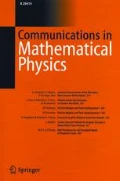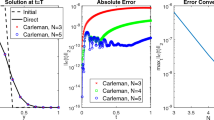Abstract
We present a quantum algorithm for systems of (possibly inhomogeneous) linear ordinary differential equations with constant coefficients. The algorithm produces a quantum state that is proportional to the solution at a desired final time. The complexity of the algorithm is polynomial in the logarithm of the inverse error, an exponential improvement over previous quantum algorithms for this problem. Our result builds upon recent advances in quantum linear systems algorithms by encoding the simulation into a sparse, well-conditioned linear system that approximates evolution according to the propagator using a Taylor series. Unlike with finite difference methods, our approach does not require additional hypotheses to ensure numerical stability.
Similar content being viewed by others
References
Aaronson S.: Quantum computing, postselection, and probabilistic polynomial-time. Proc. R. Soc. Lond. A 461(2063), 3473–3482 (2005) arXiv:quant-ph/0412187
Aharonov, D., Ta-Shma, A.: Adiabatic quantum state generation and statistical zero knowledge. In: Proceedings of the 35th ACM Symposium on Theory of Computing, pp. 20–29 (2003). arXiv:quant-ph/0301023
Berry D.W.: High-order quantum algorithm for solving linear differential equations. J. Phys. A 47(10), 105301 (2014) arXiv:1010.2745
Berry D.W., Ahokas G., Cleve R., Sanders B.C.: Efficient quantum algorithms for simulating sparse Hamiltonians. Commun. Math. Phys. 270(2), 359–371 (2007) arXiv:quant-ph/0508139
Berry, D.W., Childs, A.M., Cleve, R., Kothari, R., Somma, R.D.: Exponential improvement in precision for simulating sparse Hamiltonians. In: Proceedings of the 46th Annual ACM Symposium on Theory of Computing, pp. 283–292 (2014). arXiv:1312.1414
Berry D.W., Childs A.M., Cleve R., Kothari R., Somma R.D.: Simulating Hamiltonian dynamics with a truncated Taylor series. Phys. Rev. Lett. 114(9), 090502 (2015) arXiv:1412.4687
Berry, D.W., Childs, A.M., Kothari, R.: Hamiltonian simulation with nearly optimal dependence on all parameters. In: Proceedings of the 56th Annual Symposium on Foundations of Computer Science, pp. 792–809 (2015). arXiv:1501.01715
Berry D.W., Novo L.: Corrected quantum walk for optimal Hamiltonian simulation. Quantum Inf. Comput. 16(15–16), 1295 (2016) arXiv:1606.03443
Brassard G., Høyer P., Mosca M., Tapp A.: Quantum amplitude amplification and estimation. Contemp. Math. 305, 53–74 (2002) arXiv:quant-ph/0005055
Childs, A.M.: Quantum information processing in continuous time. Ph.D. thesis, Massachusetts Institute of Technology (2004)
Childs, A.M., Kothari, R., Somma, R.D.: Quantum linear systems algorithm with exponentially improved dependence on precision (2015). arXiv:1511.02306
Harrow A.W., Hassidim A., Lloyd S.: Quantum algorithm for linear systems of equations. Phys. Rev. Lett. 103(15), 150502 (2009) arXiv:0811.3171
Lloyd S.: Universal quantum simulators. Science 273(5278), 1073–1078 (1996)
Low, G.H., Chuang, I.L.: Hamiltonian simulation by qubitization. arXiv:1610.06546
Low G.H., Chuang I.L.: Optimal Hamiltonian simulation by quantum signal processing. Phys. Rev. Lett. 118(9), 010501 (2017) arXiv:1606.02685
Novo, L., Berry, D.W.: Improved Hamiltonian simulation via a truncated Taylor series and corrections. arXiv:1611.10033
Author information
Authors and Affiliations
Corresponding author
Additional information
Communicated by M. M. Wolf
Rights and permissions
About this article
Cite this article
Berry, D.W., Childs, A.M., Ostrander, A. et al. Quantum Algorithm for Linear Differential Equations with Exponentially Improved Dependence on Precision. Commun. Math. Phys. 356, 1057–1081 (2017). https://doi.org/10.1007/s00220-017-3002-y
Received:
Accepted:
Published:
Issue Date:
DOI: https://doi.org/10.1007/s00220-017-3002-y



